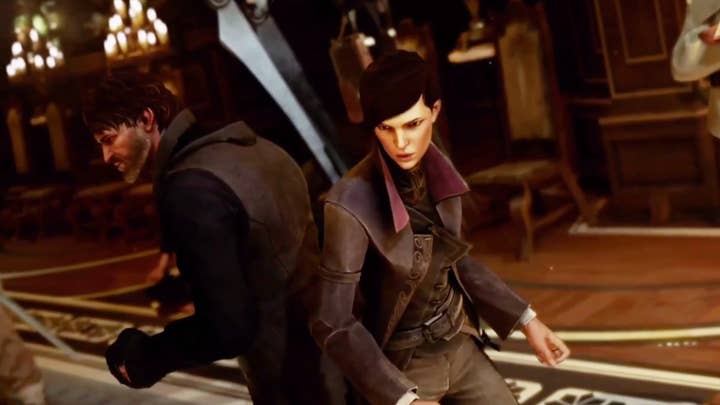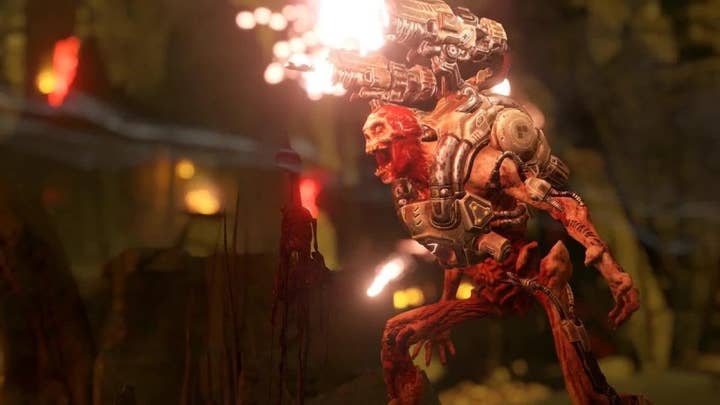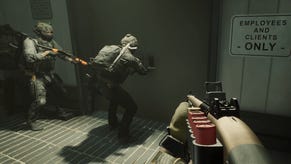Bethesda: "You can't spend any time thinking about your game as a franchise"
Marketing VP Pete Hines on building success as a publisher, and 'calling the ball' on your own mistakes
Shooter fans have rarely had it so good. October kicked off with Gears of War 4, proof that one of last generation's pivotal franchises can still shoulder the Xbox brand. That was followed by Battlefield 1, EA Dice demonstrating that exhilarating progress can be made by looking to the past. Titanfall 2 made its debut last week, its swooning reviews suggesting that Respawn Entertainment has realised some of that huge potential. And then there's Call of Duty, the franchise created by Respawn founders Jason West and Vince Zampella, which returns on November 4 with Infinite Warfare - an oddly appropriate subtitle for a series that seems to emerge as the market's leading FPS year after year, often amid spirited discussion about its imminent decline.
For those who prefer a more studied approach to first-person play, however, all that blood and thunder may feel like a distraction. On November 11, Arkane Studios returns with Dishonored 2, sequel to one of the most promising new IPs of recent times. For many critics, this is a potential game of the year winner. For Bethesda Softworks, the game's publisher, it is a gilt-edged opportunity to establish an original blockbuster franchise - separate from the enduringly popular work of Bethesda Game Studios, and the historic licenses brought under its control through ZeniMax Media's acquisition of id Software.
"This comes up a lot, with people asking, 'What are your plans for DLC?' If we don't do the game well nobody's going to want any DLC"
According to Bethesda's VP of marketing Pete Hines, however, creating something to stand alongside Doom or The Elder Scrolls demands counter-intuitive thinking. At a time when annualised, service-based franchises seem to be the conscious goal of almost every publisher working at this scale, Hines describes Bethesda as heading the other way.
"I think we try pretty hard, and certainly my focus is always, that you can't spend any time thinking about your game as a franchise. You have to focus on that one thing," he says. "Whether it's DLC, Dishonored 3 or anything else is completely irrelevant when you're making Dishonored 2, because if that game isn't great and you don't do everything as well as possible none of it is ever going to matter.
"This comes up a lot, with people asking, 'What are your plans for DLC?' If we don't do the game well nobody's going to want any DLC, because we won't have any players around to buy it. The focus is on making Dishonored 2, and then my team has to do a good job of talking about what these guys are doing so it sells well. Then we move on to what's next."

In that respect, the early signs are positive. Dishonored 2 was showered with 'Best in Show' awards and nominations at E3 and Gamescom, and the direction Arkane has taken its story resonates with the tone of the times. In Dishonored, the only playable character was Corvo, an interesting but relatively typical protagonist for a video game; in the sequel, Arkane has moved Emily Kaldwin to the centre of the experience, offering its audience the choice to play as either. As Dontnod Entertainment's Oskar Guilbert stated earlier this month, the friction around female characters in AAA games has disipated over the last few years, allowing developers total freedom in the stories they tell. According to Hines, there was nothing self-consciously progressive about the decision to make Emily a playable character, it was simply what the story demanded.
"If it was an effort to just have a female character just for the sake of having a female character - I think that kind of thing falls flat," he says. "I'm not saying we're perfect in this way, but I think at Bethesda we've done a pretty good job at embracing the idea of having choice. You play Elder Scrolls games and it's 'be whoever you want.' It's never been about being male, or having a particular name or race. Be whatever you want, do whatever you want.
"The [Arkane] team really liked the idea of not just moving the Dishonored storyline forward, but exploring Emily: what happened to her, the effect of growing up under her father, and realising that as a story. Corvo is an established character that people enjoyed, so giving players the option and giving voice to both of them seemed the right way to approach it."
"At the core it's still the same idea: seeing a game, seeing where it's at, where it's going to be, and [deciding] whether that's good enough or not, and calling the ball"
Hines reiterates that Arkane's commitment to player choice is in harmony with Bethesda's own work, and that common ground was one of the motivating factors in ZeniMax Media's acquisition of the studio back in 2010. "We wanted to work with Arkane before we want to acquire Arkane," he says, recalling the enthusiasm Fallout 3's lead designer, Emil Pagliarulo, showed for the studio's 2006 title, Dark Messiah of Might and Magic. "That interesting approach to immersive first-person games really resonated with us. So when you see what it's doing with Prey or Dishonored 2, the reason it feels like a Bethesda thing is the same reason we were attracted to the studio in the first place."
This speaks to the way that Bethesda has grown under ZeniMax Media. The acquisitions of Arkane, id Software and Machine Games represent a commitment to depth rather than breadth: the layered design of Dishonored, Wolfenstein's slickly executed narrative, Doom's finely balanced gunplay. Add to that Bethesda Game Studios' expansive RPGs and ZeniMax Online's Elder Scrolls MMO, and the company's portfolio now covers the full expanse of first-person experiences. Bethesda's success as a publisher will be built on that focus, and it has so far displayed an admirable will to acknowledge and address any failure to meet the right standard.
Prey is an example of that, Hines tells me. ZeniMax bought the license in 2009, when it was still widely known as an idiosyncratic shooter from the early days of the Xbox 360. Work on Prey 2 began soon after the acquisition, and Bethesda started openly discussing its strikingly different approach to the material in 2011. The next few years were scattered with rumours of its troubled development until, in 2014, Prey 2 was officially cancelled. The reboot, which was announced at E3 this year, bears little resemblance to either Human Head's Xbox 360 game or the abandoned Prey 2. It is very clearly the work of Arkane, though, and Hines believes that pedigree will be enough to dispel any lingering negative associations the name might carry.
"All that's really gonna matter [for Prey] is 2017, when we ship the game. If we do a good job, that's what people are going to think of Prey going forward. If not, the negativity we're going to get is gonna be all over the place, and most of it will have nothing to do with the name."

Indeed, Hines draws a line between Prey and id Software's fourth Doom game, which finally launched in May after being discussed in one form or another for eight years. That, too, was cancelled and restarted due to concerns over quality, the team drawing a line under years of work. "At the core, it's still the same idea: seeing a game, seeing where it's at, where it's going to be, and [deciding] whether that's good enough or not, and calling the ball. Saying, 'no, this is not gonna get there. We need to do something else.'
"In the case of Doom they started all over again... Ultimately, what Doom gets judged on is the thing that we shipped in May and whether or not it's good."
"If you only look at sales and sales volume, I don't know whether or not you end up acquiring the Fallout franchise"
In fact, critics judged Doom to be very good indeed, but that realisation spread slowly. Hines acknowledges a certain degree of "scepticism" that greeted the game at first. "People weren't really sure," he says. "People questioned, 'why didn't you send out review copies early?' and 'Oh, this is a big warning flag' - no, we had our reasons and we told you what they were, and you can believe us or not. But to my point, we had confidence in the game, we knew they had something good, and that's what people think of Doom now."
In the time since our conversation, Bethesda has reiterated its decision to only send out review copies of its games on the day before launch; a strategy that first came to attention with Doom, and continues to be divisive within the consumer press. Bethesda has claimed that it's a matter of ensuring that only a live, fully functioning version of each game is considered for that kind of appraisal. Among critics - as we explored in a recent article - it's widely seen as a method of controlling the tone of discussion around a given product before it launches.
With a growing release slate from a host of talented studios, Bethesda's ability to build and maintain success is being more thoroughly tested than at any time since the launch of Oblivion. The shifting value of formal reviews is likely a part of that, but, as Hines points out, even hard sales are no longer the whole story when it comes to evaluating performance.
"If you only look at sales and sales volume, I don't know whether or not you end up acquiring the Fallout franchise," he says. "I'm not saying the sales were poor. I'm just saying that they didn't accurately reflect just how good and important those initial Fallout games were.
"Sales is going to be a big part of it - we're a company, with salaries to pay and lights to keep on - but there are cases where other factors are important in shifting your thinking one way of the other... When you look at anything we've done, whether that's Dishonored or The Evil Within or Wolfenstein or Doom or whatever, certainly the sales are important, but there are other elements as well
"Now, if you sell four copies of something, you can make arguments all day long... Fortunately, we've never sold just four copies of anything."








